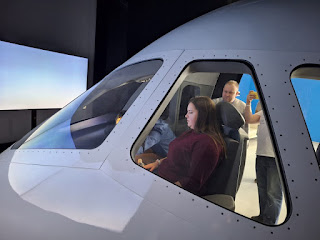 |
| MC-21 Electronic Bird Interior |
Special integration, testing, and evaluation stands have been devised by specialists from the State Research Institute of Aviation Systems (GosNIIAS) in Moscow for the “Electronic Bird” onboard equipment systems of the MC-21-310 aircraft. The equipment will facilitate virtual test flights, thereby speeding the certification process for the airliner constructed in Irkutsk.
 |
| MC-21 Electronic Bird |
In order to expedite the testing of onboard equipment, Moscow-based scientists collaborated with specialists from PJSC “Yakovlev” to develop the “Electronic Bird” supports in 2024.
The institute’s website states that the testing and evaluation of onboard equipment on such stands substantially expedites the development process, reduces overall costs, enhances testing safety, and enables the faster introduction of new aviation technology to the market.
 |
| MC-21 Electronic Bird Interior |
At present, scientists and specialists from “Yakovlev” are in the process of integrating import-substituted aircraft equipment for the MC-21 on the new stand. For instance, the “Electronic Bird” for the MC-21 comprises a collection of radio system simulators that will enable the aircraft’s navigation, landing, surveillance, and communication systems to be tested in real time by simulating the surrounding radio environment.
Virtual test flights of the Irkutsk-built “bird” will commence upon the completion of this integration procedure. These flights are scheduled for April of this year.
The “Electronic Bird” performs a variety of functions in the development and certification of the Yakovlev MC-21-310 aircraft. The simulation of flight conditions is one of its primary functions. This equipment enables the testing of avionics and engine control systems in a variety of simulated scenarios that are not feasible to replicate during actual flight tests. Engineers can evaluate the performance of various systems in real-world scenarios by establishing a controlled environment, thereby guaranteeing that they are prepared for operational use.
 |
| MC-21 Electronic Bird |
The “Electronic Bird” also plays a significant role in integration testing. The apparatus facilitates the integration of new Russian-made avionics with the Aviadvigatel PD-14 engines. This integration is essential for guaranteeing performance reliability and compatibility, especially as the MC-21-310 transitions to domestically sourced components in response to international sanctions.
Furthermore, the “Electronic Bird” makes a substantial contribution to the improvement of safety. Developers are able to identify and resolve potential issues before they impact actual flight operations by conducting these experiments on the ground. This proactive approach improves overall safety by enabling the implementation of comprehensive evaluations and modifications without the hazards associated with in-flight testing.
The “Electronic Bird” is different from the “Iron Bird,” which is a comprehensive ground-based test rig that incorporates and validates multiple aircraft systems, such as hydraulics, flight controls, and avionics. It simulates the physical configuration of these systems as they would be installed in the aircraft, enabling the comprehensive testing of their interactions under realistic circumstances. The Iron Bird is a critical instrument for ensuring the overall reliability of aircraft, as it is frequently employed during the development process to identify potential issues with system integration and performance.
 |
| MC-21 Irin Bird |
The MC-21 is a medium-haul passenger aircraft of the next generation, capable of accommodating 163 to 211 passengers. The Irkutsk Aviation Plant is the location where the airliner is constructed. Its inaugural flight occurred on May 28, 2017, and it successfully executed its inaugural flight with the Russian PD-14 engine on December 15, 2020.
 |
| MC-21 Electronic Bird Exterior |
The MC-21’s serial production has been postponed on numerous occasions. The initial aircraft deliveries to airlines were scheduled for 2024; however, in May 2024, it was disclosed that the timetable had been postponed. By 2030, the Irkutsk Aviation Plant is expected to produce a total of 270 MC-21 aircraft intended for delivery. Previous delays were associated with Western sanctions that were implemented subsequent to the commencement of the special military operation.
The aircraft’s serial production was once again postponed by Rostec CEO Sergey Chemezov at the end of January 2025. The new date for production is 2026.
Official Website of Youtube Channel – Altitude Addicts

